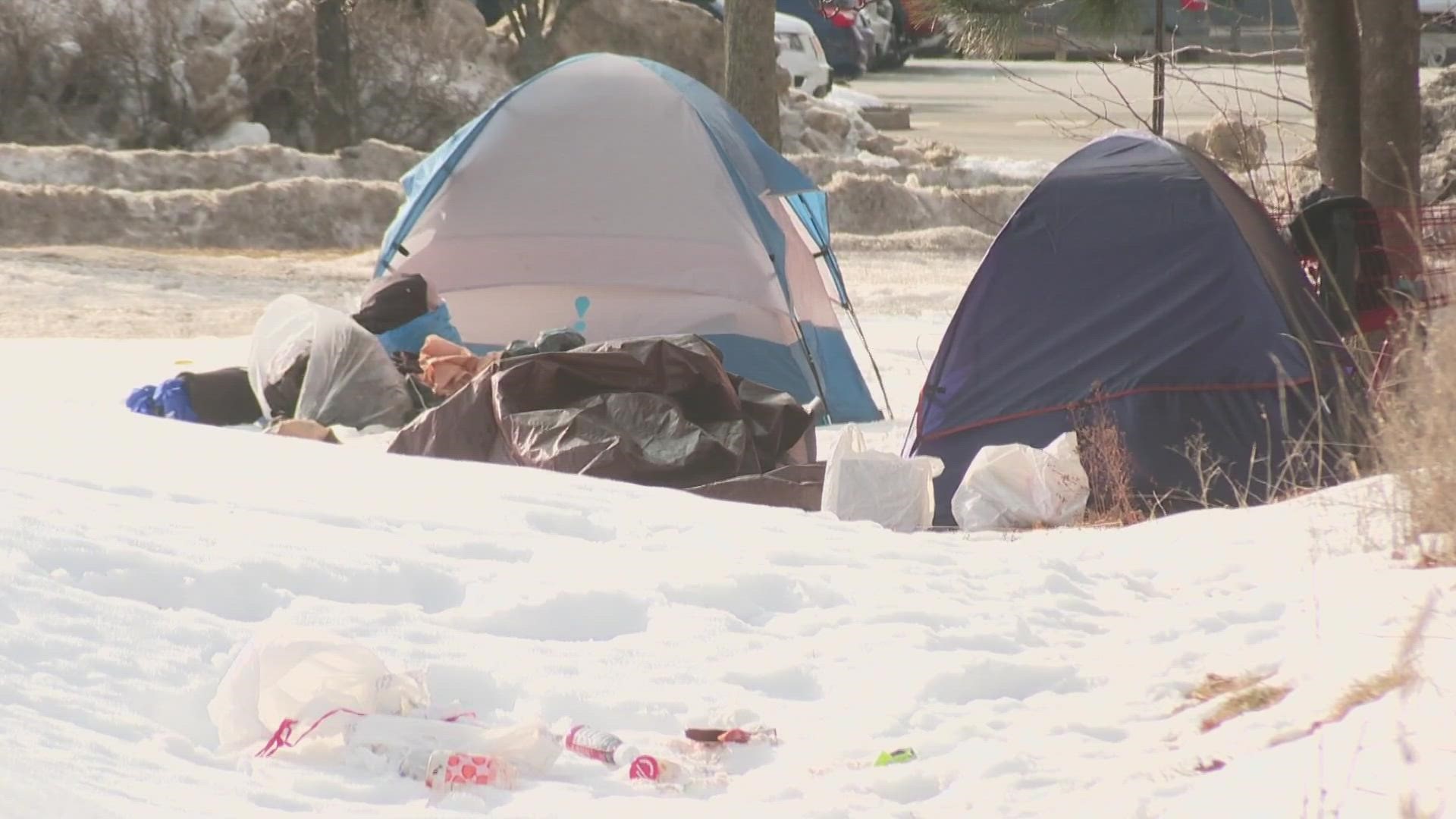PORTLAND, Maine — On a mild Wednesday morning in March, Jeffrey Logan has donned a winter hat and boots, preparing to trudge through slush gathered around the sidewalks of Portland.
He has looped his arms through a worn yellow backpack, bursting at the zipper with a load of supplies: Dunkin Donuts gift cards, hand warmers, Narcan, and socks.
For six days a week, three to four hours a day, Logan and two others wander the city streets, giving resources to people with no other place to go. This work is something Logan (or "Pastor Jeff," as he's known to the community) does through Grace-Street Ministry, a small nonprofit ministry that has been around for a while. He himself has been serving the people through this effort for nine years.
"It's astonishing," Logan said about the number of people his team has been helping recently. "It keeps increasing pretty much day by day. The resources seem to be diminishing."
Logan said he estimates right now, there are about 75 people in Portland who are camping out in tents, just trying to survive what has started to become a more typical winter, with colder temperatures and a decent amount of snowfall.
"We’ve really morphed into putting most of our funds into trying to buy tent heaters and propane," Logan said. "Unfortunately, folks in the cold have been burning hand sanitizer to stay warm."
Logan said this influx in need is partly because of pandemic-era emergency shelter programs at hotels in the area ending. He said when the last of the hotels close their doors to those experiencing homelessness by the end of April, he expects a couple hundred more people will be on the streets.
"I think people feel abandoned. I think, particularly, they don’t feel like there’s enough emergency shelter space, especially when the weather gets bad," Logan said.
Andrew Bove, vice president of social work at Preble Street, said all three of the nonprofit's shelters, with about 85 beds total, have been full every night. He said that's also true of other shelters in the area.
"Things are at a boiling point," Bove said. "You feel it on cold nights. You feel it on snowy nights. You see people out there with no place to go."
Bove said he and his team try their best to do what they can, but it's hard to help if you don't have a place to offer people to stay. He said unsheltered homelessness is on the rise across the nation because of a lack of emergency shelters, and anyone can be affected.
"No one is immune to this crisis," Bove said. "It could be your friend. It could be your neighbor. It could be a loved one."
He said as a social worker, work has been really draining lately.
"When there’s really no emergency shelter options for people, it’s just that much harder," Bove said. "It’s just harder. It’s emotionally draining. It’s difficult."
For those actually living on the streets, it's even more difficult.
"My whole entire childhood on and off, I was homeless," Lena Logan of Portland said, tearing up. "I didn’t even know it. My mom did so good. It was all by herself. She had no help at all."
Lena said she's currently sober but understands why people turn to substance use because of the realities of living on the streets.
"A lot of the time, it becomes that problem because they’re out here, and they can’t handle the pain. It’s so hard," Lena said.
"The last snowstorm and the one before that, I actually slept outside on the ramp at the shelter because there were no beds because I checked in too late," Victoria Morris, a friend of Lena's, said.
Morris has also been homeless off and on for her entire life and added, "It was like 3 o’clock in the afternoon."
Morris said she has a housing voucher and good landlord references but is still having trouble finding a place for her and her husband to live. She said the stigma doesn't help.
"When you say 'Hi' to somebody, or people look at you, they judge you," Morris said.
The Maine State Housing Authority is on a mission to address this issue statewide. The agency recently closed a request for proposals for $21 million to establish longer term solutions to homelessness. That money comes from L.D. 3 in the Maine Legislature, which Gov. Janet Mills signed into law on Jan. 4.
Dan Brennan, the director of MaineHousing, said the agency received more than 30 applications from communities across Maine.
"We’re actively trying to help support other communities, other municipalities that want to do their part and hopefully reduce the overwhelming burden that is on Portland and Bangor," Brennan said, noting that while those cities and Lewiston will always be service centers, taking some of the pressure off them will be helpful.
Brennan said even though some pandemic-era programs are coming to an end, he's optimistic that the state of Maine will be able to keep up its fight against homelessness.
"Even though a particular resource or a particular benefit might be going away, the attention to the needs of people is still at a very high level," Brennan said. "We'll find that other funding sources might become available to us, and other resources might come from communities. We’re seeing a lot more communities step up and try to address the situation."
MaineHousing said it is hoping to finalize its decision about which communities receive this money in a few weeks. Brennan said the goal is to get some of these new programs in place before winter 2024.

